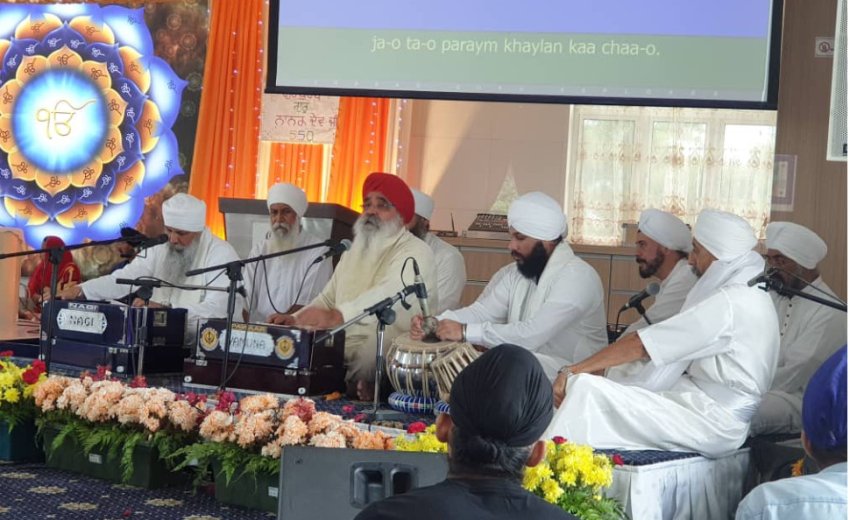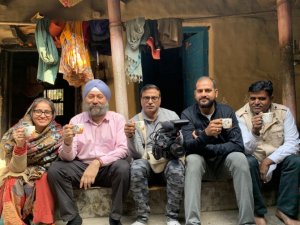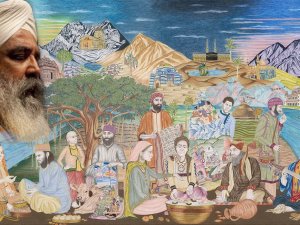SYA (Sikh Youth Australia) prides itself in presenting Sikhi to Sikh youth as a means to self-improvement and progress in this life. At this year's Sikh Family Camp (Jan.1-6, 2020), youth are urged to consider their plan for action into the new decade, the 2020's, with a first Sikhi-based personal 5 Year Plan. Well, adults too!
Most envisaged personal 5-year plans are naturally of a selfish nature where the total focus is all on personal well-being and progress, physically, emotionally and materially, rather than a more Sikhi-based holistic thrust. The focus here is to consider where Sikhi principles fit into such powerful visualisation for one's future.
Even though we call Sikhi a 'way of life', yet when it comes to plan our future, there is a tendency to leave Sikhi out! We still end up treating Sikhi as a 'religion' rather than also a useful tool not only for our spiritual progress but our materialistic future too. They should go hand in hand.
I am bemused when I sneak in to listen to some 'talks' by experts, (I like doing that) Sikhs themselves, to Sikh youth and young adults, giving very well thought out inspirational discourses on self-improvement and future financial planning for personal growth and progress, yet leaving out all aspects of Sikhi from their thrust! They will quote Anthony Robbins, Stephen Covey, Deepak Chopra, Eckhart Tolle and Kiyosaki amongst others to back their views. Yet, they ignore simple messages of our humble Baba Nanak, or even his three very basic principles of Kirt Karni, Naam Japna and Vand Shekena.
Maybe these three principles have yet to be addressed in a self-improvement mode, rather than a religious urging. In fact, why don’t we treat Nanak as a self-improvement ‘guru’?
I believe all of us should always plan ahead. New year resolutions by themselves do not last but new year resolutions as a means to reviewing and strengthening one’s longer-term 5 Year Plan prove effective. Such a longer-term plan engenders powerful visualization virtually on a daily basis attached to one’s daily prayer or nitnem routine or as western ‘self-improvement gurus’ like to say – ‘put it out there’. Here are some further pointers.
‘Putting it out there’ for a Sikh simply means – ‘telling Waheguru’. And that can only happen if your channel with Waheguru is open and serviced daily through naam – nitnem, gurbani and greater Waheguru awareness. Vin bolean sabh kich janedha kis agai kichai ardaas. (SGGSp1414) (He knows your innermost thoughts – there is no need to do special prayers for what you desire!)
I like to thank those who wrote in with suggestions, especially Dr. Chani Pangali of USA who saw my initial article on the subject a week ago and sent in some very useful pointers. Dr. Pangali, a scientist (quantum physicist I think) by profession has been involved in self-improvement and progress workshops in the corporate sector mainly in USA since I have known him - 30 years. He also edited my first book - 'Sikhing Success & Happiness'.
Here are some wider issues to consider about one's future planning besides all the basic pointers I have mentioned in Part 1. (There are, by necessity, some repetitions.)
1. A global perspective must be considered when working on a plan of visualisation for one’s future. Millions in the work force will lose their jobs due to automation, robotics, Artificial Intelligence (or Machine Learning). Even retail shopping threatens to fully become an online activity.
Fossil fuel is predominantly going to be replaced by other means of energy. Electric cars, for example, are set to replace cars using fossil fuels. Concern and alarm over the deteriorating environment are going to force the corporate world and governments to factor in budgets and innovative ideas towards environmental care opening up new employment opportunities.
Future housing and council planning will take into consideration energy saving, effective waste management, old age facilities, child minding and even on-line medical services.
I-phones are replacing laptops, cameras, closing down conventional postal services and even conventional telecommunications. Imagine the huge corporations associated to all these now obsolete services and closing down unless they reinvent themselves leading to vast redundancies but perhaps also opening up new opportunities!
During my teenage days it was normal to get a basic conventional education and then, if one wanted to be safe, and have a guaranteed future, one joined the police force, the armed forces, the government services, semi-government corporations and other such safe corporations and large companies. One worked for about 40 years and settled back with a pension at the end. All that 'security' barely exists today. Governments are privatizing and armed forces are becoming stepping-stones for future changes in career.
2. Education as we know it is getting outdated. Education as it is, will not secure jobs into the future. The pedagogy has to evolve and instead of education for information collection (which is available at the press of a button), education will have to be future career orientated. What you learned in the fields of technology and science just two years ago for example, is likely to be out of date today. The same is going to happen into this decade. Are you constantly learning and growing to keep pace with the new knowledge being discovered? Virtually daily advances in technology are changing the course of many industries. Giant corporations of yesteryear are being ground into oblivion and new ones like Google becoming global giants, even controlling economies.
We are moving into a very uncertain decade, but a decade teeming with potential and great excitement. Even the position of the US dollar as a standard for all other currencies is threatened. Fiat currencies are being threatened by crypto-currencies. China is on the verge of replacing USA as the No.1 global power.
Those who will succeed and thrive in these times are people who commit to a "Growth Mindset", of continuous learning (i.e. being a Sikh!), having a plan to reinvent themselves, and being flexible.
So, in this changing world which is going to accelerate into the new decade, the Sikh is the one who is not only a student, but also the first to adapt to change and ready and able to re-invent, refashion, remodel and redesign oneself. One who is able to change direction in one's thinking and learning – not just a survivor but a winner, and not afraid to stand out - be a trend-setter not a trend-follower. A Sikh is one who responds to change, initiates change and does not react to change.
The trait, or if I may say so, the ‘gene of adaptibility’ is already ingrained in us as Sikhs. Sikhs are now a global community. We have faced persecution at home in India and also overseas as a minority and we work even harder to succeed, learn foreign languages, adapt to new cultures and yet retain our Sikhi life philosophy and identity. Sikhs have not been afraid to go to distant lands and have dared to succeed. We are adaptable to a changing world. In fact, we are the change. There are large numbers of Sikh IT pioneers, entrepreneurs and progressive innovators not only in western countries but globally, let alone in India. Yet we are proud of our life philosophy, which has played a very important part in our overall success, with a rich history, full of struggle and triumph. And it is our collective responsibility to pass on this life philosophy to our younger generations.
I know of far-sighted Sikh friends who are ensuring that their youth are learning Mandarin and Japanese, not German or French! They can see the writing on the wall and are responding accordingly. (We just need to ensure that we teach our younger generations Punjabi/Gurmukhi not for commercial or economic purposes but to keep close to the Guru and our elders and in so doing, our background.)
We must be fully aware and conversant with the tremendous change which is going to happen in this coming decade, and we are spiritually, physically and mentally equipped for that.
3. In this decade, engaging with the community will become increasingly important. It means you don't measure yourself simply in terms of personal material gain or even family. Rather you derive joy from giving and receiving from a much larger group. In turn, the community can and will open opportunities for contribution and rewards for you. One needs to embrace that at a young age. I believe it is unethical for anyone of us to expect all the benefits of a close-knit community yet give nothing back or not contribute positively towards its wellbeing and growth.
For this, the community too will need to change to be more adaptable. Rather than just being a gurdwara-based community immersed in religion, rituals and langgar (all very important aspects), the community needs to be pro-active to the coming change, with internet hubs within gurdwara complexes, courses pertaining to oncoming changes and more dialogue based services discussing and disseminating current affairs and future trends. YOU will have to play a greater part for bringing about such a quantum shift in our community affairs and especially within gurdwaras.
I know of Sikh organisations like SHS (Sikhs Helping Sikhs) and one whatsapp group helping other Sikhs and especially Sikh youth to give them direction and even find jobs for them. More such community activity is needed especially through gurdwaras.
4. Long terms vs short term view. Back to the 5-year plan. People who live in the short term, with little long-term planning and with little or no community service are usually nervous and afraid of what change might bring. Is their job safe? Or, is the course of study they are pursuing, relevant for the future? Will they have enough for retirement? Do they have a good support system. People with a medium to long-term view and immersed in community activities are happier, because they know their plan is working for them. They plan for contingencies. They derive support from the community. Their faith is further strengthened by the good deeds and sewa that they carry out.
5. Time is the most precious commodity. Spend it wisely. Develop good habits that take you to your goals. Watch out for detractors, other distractions and actions that derail you. Carve out time on your calendar for downtime, for your relations, for the community, for reading, growth, spirituality, for proper amount of sleep and cut back on television, cable and social media.
Read about the change occurring around you through magazines, newspapers, books, audio books. Be informed. Avoid if possible, or at least minimize, social media. When you get an opportunity, write, e.g. for a class or school newspaper, blogs. Write stories. Discuss science and spirituality with your family and friends. Explore and discuss with close ones and friends what spirituality means to you. There are so many opportunities to help yourself and others. Take others along on the journey of your spirituality, learning and growth, especially your own family.
5. Understand why your mind may be telling you to go in a different direction. One would have heard about reaching for the "Inner Child" within. But the inner child seeks pleasure and gratification, and short cuts. Instead the new buzzword now is - learn to listen and live by the "Inner Parent" - that inner voice of reason that knows right from wrong. Make that a habit. It is the only way to achieve your long-term goals.
Understand that if you live one way now, listening to the Inner Child, and you want to switch over to listening to the Inner Parent, you will encounter resistance. It will take time and sustained effort. Visualize your goals. Develop a Vision Map. They will keep you going.
6. Like any planning, track your accomplishments against your goals. At regular intervals peruse your 5 Year Plan. Tweak it accordingly but keep visualising the positive end-result at all times.
7. Be humble. Humility is the cornerstone of our ‘way of life’. Keep your plans to yourself. Others will discourage you, mock you, derail you. As you get little bits of success, become even more humble, and revisit your goals. Are they big enough? Do they need adjusting?
8. Visualize yourself as an honest, honorable, truthful, upstanding, giving adult, doing good in society and being the best in your chosen field. Put in the planning, effort, dedication, and regular course corrections.
10. You are the average of 5 of your best friends. (This is a claim by a number of self-improvement ‘gurus’. I see merit in mentioning this here.) Do you need to change friends, so you can be in better company? Thinking outside the box - perhaps one of your best friends needs be your Guru Ji. This is a further elaboration of what ‘sangat’ means. You ‘are’ the kind of ‘sangat’ you gravitate to. We normally associate sangat with those inside a gurdwara. But sangat simply means the company we like to keep. Are your best five friends helping to gear you towards materialistic and spiritual success and happiness? Or are they just your leisure, good time mates?
11. Include your immediate family in your 5 Year Plan because they play a very important part in your development. A comfortable and peaceful home life is important for personal well-being. Family satsang (perhaps just Rehras in the evening) and eating at least one meal together are very strong old fashioned, family-time activities which lead to family harmony and a love for the home, and happiness.
12. Volunteering at the gurdwara brings humility and satisfaction. Make it an important part of your routine. If you are an older person, then teach classes at the gurdwara, mentor younger children and help them to start their development journey.
In conclusion, when planning ahead for your next five years, do not forget your Sikhi which is the base of all your self-progress and success. That is why – ‘Waheguru Ji Ki Fateh’. (All success, happiness and achievements are by His Grace.)
The SYA Family Camp (Sydney, Australia) is from 1-6 January. Dya Singh is contactable on whatsapp +61403181818 (messages only) for further information or refer SYA website. We encourage families to come. Bring your family for a week of Sikhi living. This is the best way to start the new year and the 2020 decade.
Our guest facilitator this year is Bhai Sahib Guruka Singh, a founding member of Sikhnet.com (USA) besides Dr. Jaswant Singh (SikhRI, Texas, USA), S. Hari Singh (NZ), Giani Sukdaiv Singh Gurpuri (M’sia), Veer Manpreet (UK) and myself.





